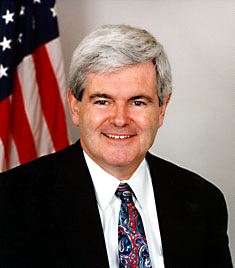
What to make of the former gentleman from Georgia? Newt Gingrich devolved from being an outspoken member of the Sierra Club to helming a House of Representatives renowned for its hostility toward the environment. Now Gingrich has coauthored, with conservation professor and former zoo CEO Terry Maple, A Contract with the Earth, a tome released this month that calls for an era of environmental stewardship, albeit one driven by markets, science and technology. The chapter headings quote Emerson, Jacques Cousteau, John Muir and others, including revered Harvard biologist E.O. Wilson, who wrote the book’s foreward.
Is Gingrich jumping on the hottest (no pun intended) national trend to keep himself in the game? Or is he merely bouncing back to his old views now that he’s unencumbered by intense political pressures? To wit, Gingrich’s voting record on conservation and pro-environment measures deteriorated fairly steadily during his years in Congress, according to the annual voting scorecards of the League of Conservation Voters. When he was a newbie in 1979-80 (tail end of the Carter era), the League gave him a 44.5 percent score–pretty darn good for a Republican. Gingrich fared nearly as well during the Reagan years (1981-1988), with an average score of 39 percent.
But then something happened: His LCV scores from 1988 (Bush I) through 1994 (Clinton mid-term) fell to a dismal 11 percent on average. In ’94, the year Gingrich rode his Contract with America to the speakership of the House, he was awarded a big fat zero. …
Gingrich’s transformation didn’t go unnoticed by Carl Pope, executive director of the Sierra Club. In a 1995 letter to Gingrich published in the club’s Sierra magazine, he cited a questionaire Gingrich filled out while a club member from 1984 to 1990. In the questionaire, Pope noted, Gingrich opposed drilling in ANWR, calling it a “180-day quick fix” and stating that “Fuel efficiency and conservation measures have a greater potential for providing long-term energy security for our nation.”
Pope also reminded Gingrich of his stated opposition to the way the nation’s forests were being managed: “I oppose below-cost timber sales and uneconomic roadbuilding in our national forests, period,'” you said. “Subsidized logging operations, as well as subsidized forest roadbuilding, at the U.S. taxpayer’s expense, should cease. It’s unfortunate that national forest management yields too often to local special interests.”
Pope further noted Gingrich’s pledge to support federal programs to protect wetlands. “The ecological significance of freshwater wetlands, and the significance of the rapidly declining acreage of wetlands in the United States, cannot be overemphasized,” you warned, Pope wrote, further quoting the congressman. “It is vital that our wetlands are protected.”
After more such points, Pope basically asked, What gives?
Now you are Speaker of the House, and have initiated a Contract With America. While public debate on this contract has focused on other aspects, buried within it is a covert attack on the environment that is wildly at odds with the record you built up during most of your political career.
How are we to reconcile the old Newt Gingrich with the new? The old Gingrich pledged to protect the wetlands that provide us with clean water, flood protection, and abundant wildlife, while the new Gingrich would require the taxpayers to compensate any property owner, however large and wealthy, whose property value was diminished by as little as 10 percent as a result of protecting those wetlands.
Given your positive environmental record, what led you to select, as chairs of the key environmental committees in the House, members with anti-environmental voting records as extreme as Don Young’s of Alaska and Thomas Bliley’s of Virginia? (Both received ratings of zero from the League of Conservation Voters last year.)
Why does your Contract advocate a radical version of risk assessment, the pseudoscientific process of judging when a poison is ‘safe enough’ to inflict on the public? The risk assessment standards in the Contract would delay indefinitely the promulgation of those same clean-air standards you were once so eager to promote.
And why, especially as a former Sierra Club member, did you use membership in the Club as a negative litmus test in questionnaires given to potential House staff employees?
Why indeed. And why should a man who traded in his environmental credibility in pursuit of power now be given credit as part of the solution? Alas, life ain’t fair. It’s always the retired generals, after all, who belatedly voice their disagreements with their commander in chief. I suppose we’ll take what we can get.

















